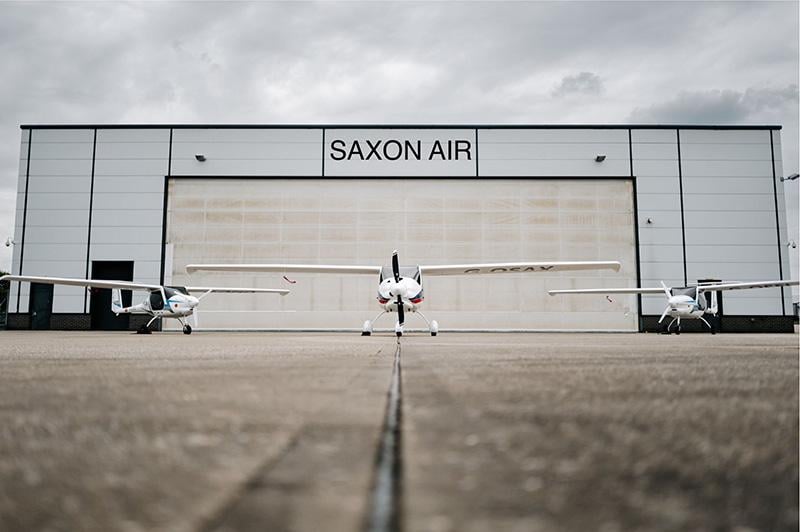
Two Velis Electro aircraft flank the new Explorer outside Saxonair's Norwich facility
OXFORD–Saxon Air, the Norwich Airport-based helicopter and fixed-wing charter operator, has launched a low-emissions flight-training center. The firm is offering a range of vocational flying qualifications on a fleet that includes Pipistrel Velis Electro and Explorer (Virus 121A) aircraft. Advanced training is provided on a Diamond DA40.
"We wanted to do a pure electric PPL [private pilot license] course: you can't do that at the moment," Saxon Air CEO Alex Durand said during a presentation at Oxford Airport, where Saxon Air has helicopters based. "We can offer an electric light aircraft PPL - you can do that because that's within the range limitations."
Initially, the company intends to offer a separate electric aviation training module. "And then, as the battery power improves - which is coming - we'll start to blend it more" with the standard PPL course, Durand said.
Saxon Air leased a Velis Electro from NEBOair, initially for a year. "Originally that was to work out how do we host these aircraft of the future as an FBO," Durand said. The firm is extending the lease, adding a second Velis as well as the Explorer, which, Durand says, is the first of the type to be registered in the UK. The latter has "about 40% of the emissions of a traditional [equivalent] aircraft," Durand said, citing manufacturer figures. Saxon Air's commercial pilots, who will be providing the training, have compared the Explorer's avionics favourably with the company's Embraer Phenom 300, he added.
"If people want to learn to fly all the way through to commercial, we want them to be able to do it through us, and socially responsibly," Durand says. "It's a way of doing flight training from the start, baking in doing it as responsibly as you can."
As part of a wide-ranging program to ensure the company is operating as sustainably as possible, Saxon Air has completed an installation of solar photovoltaic arrays at Norwich and is considering adding wind turbines to the roof of its buildings. Already, Durand says, the firm is sometimes able to produce almost all the electricity it requires from the solar array. The aim is to be able to operate electric aircraft "genuinely completely off grid, self-powered from our facility," he says.
The training operation is unlikely to contribute a considerable amount to Saxon Air's bottom line, but Durand stressed the importance the project plays in helping to increase the company's relevance to its local community, and in encouraging people into aviation who may have been put off because of environmental impact concerns. The firm will be prioritizing access for students and under-18s, and offering training packages that will be priced at a point that is "as affordable as we can," he said.
"While [the low-emissions training] is a very small part of our operation, the biggest thing about it is it makes what we do accessible," Durand said. "Lots of people want to learn to fly and they don't feel they can. If you can say 'You can - it's responsible,' you see the energy, the enthusiasm, the smiles on the face. We've had some of the most excited people you've ever seen, just because they realize they can learn to fly."





